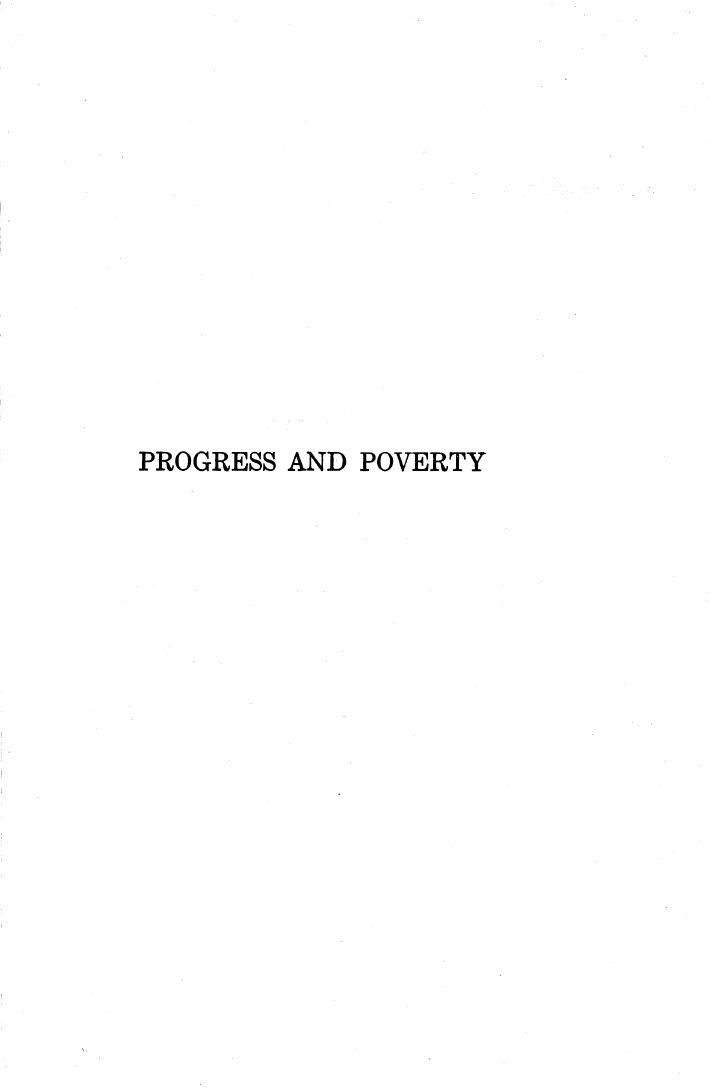Progress and Poverty by Henry George

Author:Henry George [George, Henry]
Format: epub, azw3, pdf
Tags: Economics
Publisher: Robert Schalkenbach
Published: 2010-11-18T21:25:04.912957+00:00
Chapter 24
Ineffective Remedies
OUR CONCLUSIONS point to a solution. It is so radical that it will not be considered if we believe less drastic measures might work. Yet it is so simple that its effectiveness will be discounted until more elaborate measures are evaluated. Let us review current proposals to relieve social distress. For convenience, we may group them into six categories: 1. More efficient government
2. Better education and work habits
3. Unions or associations
4. Cooperation
5. Government regulation
6. Reistribution of land
1. More efficient government
Social distress is largely attributed to the immense burdens of government: huge debts, military establishments, and general extravagance (which is especially characteristic of large cities). We must also include the robbery of protective tariffs, which take a dollar or more out of the 166
The Remedy
pockets of consumers for every quarter they put in the treasury.
The connection between these immense sums, taken
from the people, and the privations of the lower classes seems obvious. From a superficial viewpoint, we might
naturally suppose that reducing this enormous burden
would make it easier for the poor to make a living. However, considering the economic principles we have identified, we can see that this would not be the effect. Reducing taxes taken from production would be
equivalent to increasing productivity. It would, in effect, add to the productive power of labor—just as increasing population and technological improvements do. As it does in those cases, any advantage would go to landlords in higher rents. The great advances of power and machinery have not alleviated poverty—they have only increased rent. And so would this.
I will not dispute that if these things could be done
suddenly, without the destruction of a revolution, there might be a temporary improvement in the condition of
the lowest classes. Unfortunately, such reform is clearly impossible. Yet even if it were possible, any temporary improvement would ultimately be swallowed up by increased land values. Ultimately, the condition of those who live by their labor would not be improved.
A dim consciousness of this is beginning to pervade
the masses, and it constitutes a grave political difficulty closing in around the American republic. Those with
nothing but their labor care little about the extravagance of government. Many—especially in the cities—are
disposed to look upon it as a good thing, “furnishing
employment ” and “putting money in circulation.”
Ineffective Remedies
167
“Boss Tweed”* robbed New York as a guerrilla chief might a captured town. He was one of the new banditti grasping control of government in all our cities. His thievery was notorious, his spoils blazoned in big diamonds and lavish personal expenditure. Yet he was undoubtedly
popular with a majority of the voters.
Let me be clearly understood. I am not saying economy
in government is not desirable. I am simply saying that reducing the cost of government will have no direct effect on eliminating poverty or increasing wages— as long as land is monopolized.
Nonetheless, every effort should be made to reduce
useless expenditures. The more complex and extravagant government becomes, the more it becomes a power distinct from, and independent of, the people. We face momentous problems, yet the most important questions of government are barely considered.
Download
Progress and Poverty by Henry George.azw3
Progress and Poverty by Henry George.pdf
This site does not store any files on its server. We only index and link to content provided by other sites. Please contact the content providers to delete copyright contents if any and email us, we'll remove relevant links or contents immediately.
International Integration of the Brazilian Economy by Elias C. Grivoyannis(111057)
The Radium Girls by Kate Moore(12026)
Turbulence by E. J. Noyes(8047)
Nudge - Improving Decisions about Health, Wealth, and Happiness by Thaler Sunstein(7706)
The Black Swan by Nassim Nicholas Taleb(7128)
Rich Dad Poor Dad by Robert T. Kiyosaki(6632)
Pioneering Portfolio Management by David F. Swensen(6300)
Man-made Catastrophes and Risk Information Concealment by Dmitry Chernov & Didier Sornette(6019)
Zero to One by Peter Thiel(5800)
Secrecy World by Jake Bernstein(4751)
Millionaire: The Philanderer, Gambler, and Duelist Who Invented Modern Finance by Janet Gleeson(4478)
The Age of Surveillance Capitalism by Shoshana Zuboff(4291)
Skin in the Game by Nassim Nicholas Taleb(4248)
The Money Culture by Michael Lewis(4207)
Bullshit Jobs by David Graeber(4190)
Skin in the Game: Hidden Asymmetries in Daily Life by Nassim Nicholas Taleb(4004)
The Dhandho Investor by Mohnish Pabrai(3764)
The Wisdom of Finance by Mihir Desai(3746)
Blockchain Basics by Daniel Drescher(3581)
